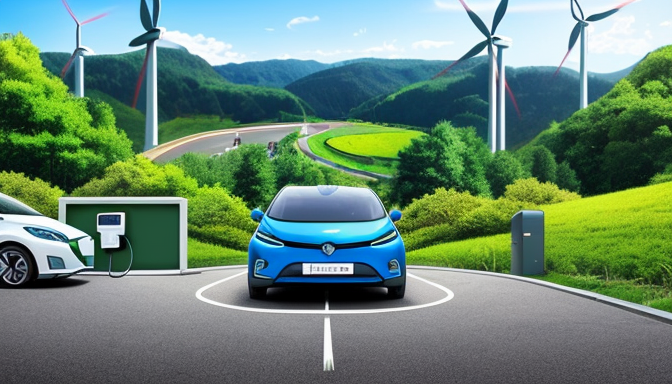In today’s world, where climate change is a pressing concern, the choice between electric and hybrid cars is more than just a personal preference; it’s a critical decision for our planet’s future. As we dive into the future of transportation, understanding the environmental implications of these vehicles can help us make informed choices. Electric vehicles (EVs) are often hailed as the heroes of sustainability, boasting zero tailpipe emissions, while hybrid cars combine traditional and electric power to reduce fuel consumption. But how do they really stack up against each other in terms of their carbon footprints and overall impact on the environment?
When analyzing the lifecycle carbon emissions of electric and hybrid cars, it’s essential to consider not just their operational emissions but also the energy sources used to power them and the manufacturing processes involved. For instance, while EVs produce no emissions while driving, the electricity that charges them may come from fossil fuels, leading to indirect emissions. On the other hand, hybrids typically emit fewer pollutants than conventional vehicles, but they still rely on gasoline, which contributes to their carbon footprint. It’s like comparing apples to oranges—both have their pros and cons, but the ultimate impact depends on how they’re used and produced.
Another crucial aspect of this debate revolves around the materials used in electric and hybrid vehicles. The production of batteries, particularly lithium-ion batteries, requires significant amounts of resources such as lithium, cobalt, and nickel. The extraction of these materials can have severe ecological consequences, including habitat destruction and water pollution. Therefore, while EVs may offer a cleaner ride, the environmental cost of battery production cannot be overlooked. As we continue to innovate in this space, it’s vital to seek sustainable practices that minimize resource consumption and enhance the overall sustainability of our transportation systems.
Comparative Carbon Footprints
When we dive into the future of transportation, it’s essential to understand the carbon footprints of electric and hybrid vehicles. Both types of cars aim to reduce our reliance on fossil fuels, but they do so in different ways. Electric vehicles (EVs) run entirely on electricity, while hybrids combine a traditional internal combustion engine with an electric motor. This fundamental difference leads to varied lifecycle carbon emissions, making the comparison quite intriguing.
To illustrate this, let’s consider the lifecycle emissions from production to disposal. On average, electric cars produce more emissions during manufacturing due to the energy-intensive process of battery production. However, once on the road, they often have a significantly lower carbon footprint over their lifespan compared to hybrids, especially if charged with renewable energy. In contrast, hybrids generate fewer emissions during production but may not achieve the same level of efficiency as EVs in the long run.
| Vehicle Type | Average Lifecycle Emissions (tons CO2) | Efficiency (MPGe) |
|---|---|---|
| Electric Vehicle | 40 | 120 |
| Hybrid Vehicle | 50 | 60 |
In summary, while electric vehicles start with a higher carbon footprint due to their manufacturing process, they can ultimately offer a cleaner and more sustainable option over time. The choice between electric and hybrid vehicles is not just about immediate emissions but also about the long-term impact on our planet. So, when you think about your next car, consider not just the present but the future!

Resource Consumption and Sustainability
When we dive into the future of transportation, the conversation around electric and hybrid vehicles isn’t just about the shiny new tech; it’s also about the resources that fuel this revolution. While these vehicles promise reduced emissions and a cleaner planet, we must consider the environmental costs associated with their production. For instance, the extraction of lithium, cobalt, and nickel, essential for batteries, poses significant ecological challenges. Imagine a world where the demand for these materials leads to deforestation, polluted water sources, and disrupted ecosystems. It’s a paradox: we aim to save the planet, yet our pursuit may inadvertently harm it.
Moreover, the manufacturing process of electric and hybrid vehicles requires an extensive amount of energy, often sourced from fossil fuels. This brings us to the question: Are we truly making progress? To better understand this, let’s look at a comparison of resource consumption:
| Resource | Electric Vehicles | Hybrid Vehicles |
|---|---|---|
| Lithium | High | Moderate |
| Cobalt | High | Low |
| Nickel | High | Moderate |
As we can see, electric vehicles typically require a higher quantity of critical resources compared to hybrids. This raises an important point: while electric cars may be the poster child for sustainability, we need to critically evaluate the entire lifecycle of these vehicles. Are we prepared to tackle the environmental consequences of resource extraction and production? Only then can we truly embrace a sustainable future.
Frequently Asked Questions
- What is the main difference between electric and hybrid cars?
Electric cars run solely on electricity, while hybrid cars use a combination of gasoline and electric power. Think of electric cars as the all-in-one powerhouses, while hybrids are like the versatile multi-tools of the automotive world.
- How do the carbon footprints of electric and hybrid cars compare?
Electric cars typically have a lower carbon footprint over their lifetime compared to hybrids, especially if charged using renewable energy. However, the manufacturing process for batteries can be resource-intensive, which is where hybrids sometimes have an edge.
- Are electric cars more sustainable than hybrids?
While electric cars are often seen as more sustainable due to zero tailpipe emissions, the sustainability of both types depends on factors like battery production and energy sources. It’s a bit like comparing apples and oranges; both have their pros and cons!
- What are the environmental impacts of battery production?
Battery production can lead to significant ecological consequences, including resource depletion and pollution. It’s crucial to weigh these impacts against the benefits of reduced emissions during the vehicle’s operation.